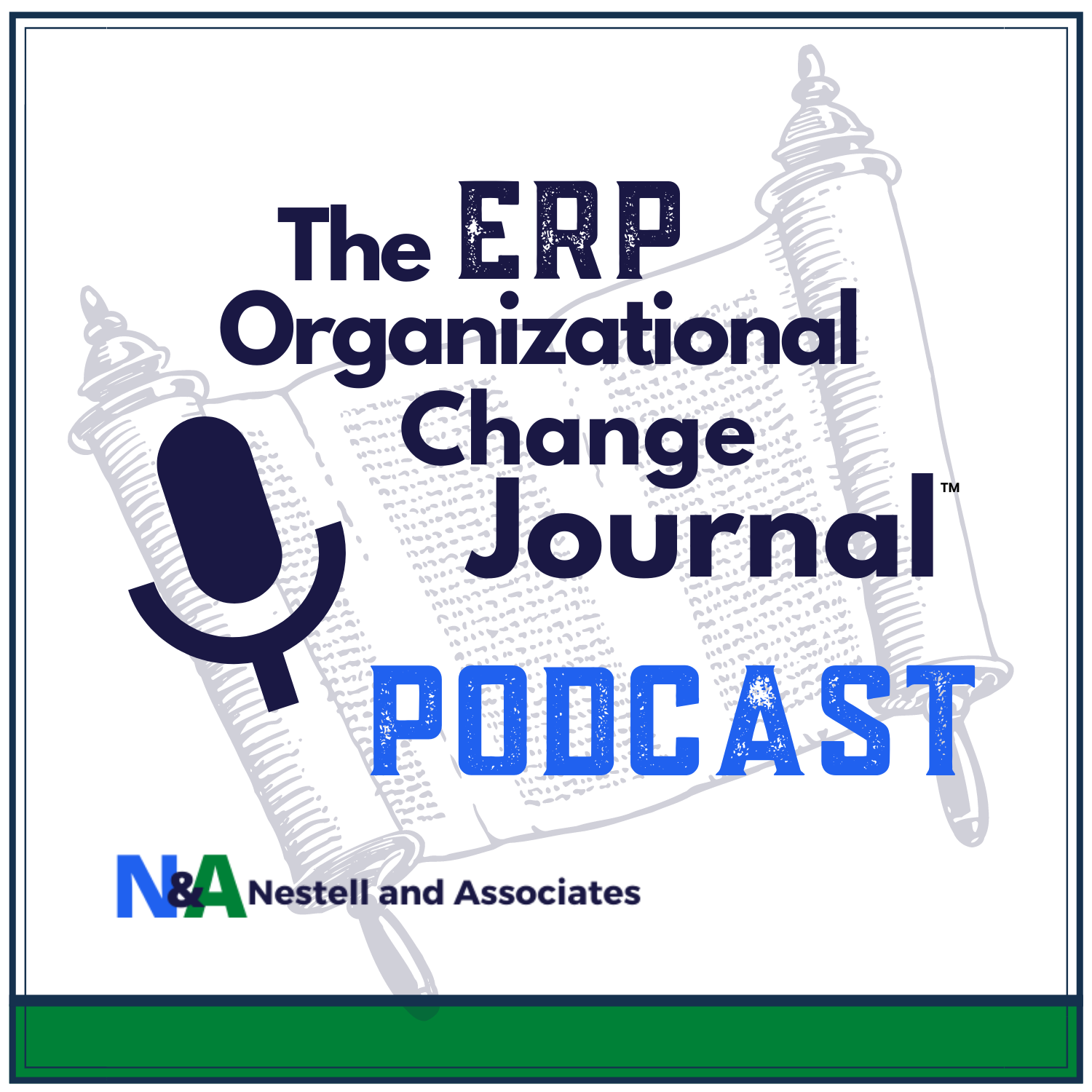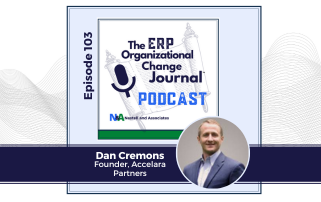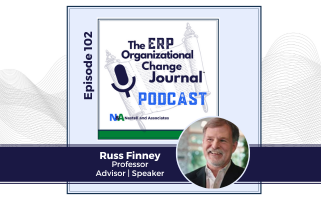About this Episode
In this episode, we discuss “ERP Organizational Learning and Development” with Dr. Clark Quinn. This episode will examine the influences that could enhance learning and performance in an organization through research-based principles.
We examine organizational learning and how, as Dr. Quinn describes, “learning science allows L&D to design and make decisions on a sound understanding of how we think, work, and learn”. We will explore several topics with Clark including; some learning principles founded in sound research, learning myths (and why they are appealing), why L&D should be a strategic influence during ERP organizational change, L&D and organizational performance, challenges of effective L&D, measurement and evaluation, and more. Please join us for ERP Organizational Learning and Development insights!
Stream this Episode Here and Subscribe on all Major Platforms
We want this podcast to be the most useful podcast you listen to. And we need your help! Please leave us a podcast review!
Dr. Clark Quinn
Dr. Clark Quinn – Dr. Quin is Executive Director at Quinnovation and has been involved in the design, development, and/or evaluation of a wide variety of educational technology for over 30 years.
More About Dr. Quinn
Clark keynotes both nationally and internationally and is the author of numerous articles, chapters and books. Dr. Quinn has, to date, written six books at the intersection of learning and technology. His most recent books include “Learning Science for Instructional Designers”, “Millennials, Goldfish & Other Training Misconceptions”, and “Revolutionize Learning & Development”.
Dr. Quinn serves as a director and treasurer of the International Board for Standards in Training, Performance, and Instruction, and is on the advisory board for the Learning Development Accelerator and Boise State’s program in Organizational Performance and Workplace Learning.
Connect with Clark
email address: info@quinnovation.com
Episode Resources and Links
Website https://quinnovation.com
Blog Articles and videos https://blog.learnlets.com/
Quinn, C. (2021), “Reading Research?”, https://blog.learnlets.com/?s=Reading+Research.
Quinn, C. (2021), “Iterating and evaluating”, https://blog.learnlets.com/?s=Iterating+and+evaluating
Quinn, C. (2021), “Making it Meaningful”, https://blog.learnlets.com/?s=Making+it+Meaningful
Quinn, C. (2021), “Misaligned expectations”, https://blog.learnlets.com/?s=Misaligned+expectations
Quinn, C. (2021), “A message to CxOs 2: about org learning myths”, https://blog.learnlets.com/?s=A+message+to+CxOs+2%3A+about+org+learning+myths
Clarks Books https://quinnovation.com/books.html
Quinn, C. N. (2021). Learning Science for Instructional Designers: From Cognition to Application. American Society for Training and Development. https://play.google.com/store/books/details?id=yIskEAAAQBAJ&rdid=book-yIskEAAAQBAJ&rdot=1&source=gbs_vpt_read&pcampaignid=books_booksearch_viewport
Quinn, C. N. (2018). Millennials, goldfish & other training misconceptions: Debunking learning myths and superstitions. American Society for Training and Development.https://play.google.com/store/books/details?id=BBVSDwAAQBAJ&rdid=book-BBVSDwAAQBAJ&rdot=1&source=gbs_vpt_read&pcampaignid=books_booksearch_viewport
Quinn, C. N. (2014). Revolutionize learning & development: Performance and innovation strategy for the information age. John Wiley & Sons. https://play.google.com/store/books/details?id=mJJSAwAAQBAJ&rdid=book-mJJSAwAAQBAJ&rdot=1&source=gbs_vpt_read&pcampaignid=books_booksearch_viewport
Mentions
Beer, M., Finnstrom, M., & Schrader, D. (2016). The great training robbery. Harvard Business School Research Paper Series, 16-121. https://papers.ssrn.com/sol3/papers.cfm?abstract_id=2759357
Norman, D. (2009). The design of future things. Basic books, https://books.google.com/books?hl=en&lr=&id=nVQPAAAAQBAJ&oi=fnd&pg=PR11&dq=don+norman+The+invisible+computer&ots=eUo8P3OZ-o&sig=xwd4RZ5oHakuVsy43RgVuybJsss#v=onepage&q=don%20norman%20The%20invisible%20computer&f=false
Bean, C. (2014). The accidental instructional designer: Learning design for the digital age. American Society for Training and Development. https://books.google.com/books?hl=en&lr=&id=MOnYBAAAQBAJ&oi=fnd&pg=PT4&dq=%E2%80%9CThe+accidental+instructional+designer&ots=hHYs2F0RKg&sig=ePJHytlEUIYLIgjDz_1-n6i7oUM#v=onepage&q=%E2%80%9CThe%20accidental%20instructional%20designer&f=false
Episode Highlights & More about this Episode: ERP Organizational Learning and Development
05:49 First, how would you define L&D for our listeners?
06:26 Why does L&D matter in the context of organizational or educational learning? That is, is there a correlation between effective L&D and improvements in organizational and/or individual performance?
11:30 You mention on your website that “L&D isn’t doing near what it could and should, and what it is doing, it is doing badly. Other than that it’s fine.” How so? What do you mean by this?
14:33 You wrote a blog title “Reading Research?” (14 September 2021 by Clark) that I found to be interesting. It is really a follow-up to your Myths book in which you discuss how we (properly) develop learning science that informs us in reading research. You also share that you, like me, see yourself as an advocate and promoter for sharing research. But let me share a couple of excerpts: “Generally, theory drives research. You’ve created an explanation that accounts for observed phenomena better than previous approaches. What you do then, is extend it to other predictions and test them. Occasionally, we do purely exploratory studies just to see what emerges, but mostly we generate hypotheses and test them. We do this with some rigor. We try to ensure that the method we devise removes confounding variables, and then we use statistical analysis to remove the effects of other factors.”….”Moreover, we then need to share this with our colleagues so that they can review what we’ve done. We need to do it in unambiguous language, using the specific vocabulary of our field. And we need to make it scrutable. Thus, we publish in peer-reviewed journals which means others have looked at our work and deemed it acceptable. However, the language is deliberately passive, unemotional, and precise, as well as focused on a very narrow topic. Thus, it’s not a lot of fun to read unless you really care about the topic!” You then state that “There are problems with this.” Please explain why to our listeners and why is this important to effective L&D?
19:22 Would you say that the lack of effective research translators is one reason why L&D is not necessarily effective L&D?
22:45 Clearly, or maybe not so clearly, effective, and efficient L&D requires effective and efficient measurement and evaluation. You have an article, “Iterating and evaluating” (7 September 2021 by Clark ) in which you state that “I’ve argued before about the need for evaluation in our work. This occurs summatively, where we’re looking beyond smile sheets to determine the impact of our efforts. However, it also should work formatively, where we’re seeing if we’re getting closer. Yet there are some ways in which we go off track.” What do you mean by summatively and formatively, and why does it matter?
25:05 In “Making it Meaningful” (31 August 2021 by Clark) you state that “That’s the point, really. To get people willing to invest in learning, you have to help people see that they do need it. (Also, that they don’t know it now, and that this experience will change that.). You need to be engaged in making it meaningful!” In general, can you share with our listeners the framework in which to do that?
27:26 In your article “Misaligned expectations” (29 June 2021 by Clark) you share some interesting ideas on the expectations of L&D, “As part of the Learning Development Conference…Given that the focus is on evidence-based approaches, a group set up a separate discussion room for learning science. Interestingly, though perhaps not surprisingly, our discussion ended up including barriers. One of the barriers, as has appeared in several guises across recent conversations, are the expectations on L&D. Some of them are our own, and some are others, but they all hamper our ability to do our best. So, I thought I’d discuss some of these misaligned expectations.” Please share more with our listeners.
32:34 I think that many L&D professionals recognize that there are many learning myths that are perhaps not really founded in principle. Can you touch on a couple of these “Myths” for our listeners?
37:26 As fellow practitioners, we absolutely benefit from learning from our colleagues and friends, both “boots on the ground” as well as researchers. How would you summarize this conversation? That is, if you had to distill your work into 3 or 4 sentences, what would you say to ERP organizational change practitioners?
More Related Episodes from TheERPocj & Blog Posts
Episode 37: Learning and Development and Human Performance Technology and its Return on Investment, Dr. Tim Brock
Episode 30: Evidence-Based Performance Improvement, Mr. Guy Wallace
Episode 22: Effective Principle Based Learning, Mr. Alexander Salas
Episode 19: Training Evaluation, Dr. Jim Kirkpatrick
Episode 10: Leadership: Myths, Behaviors, and Practice, Dr. Gary A. DePaul
Episode 9: Team Performance and Organizational Development, Dr. Timo Sandritter
Episode 2: Organizational Performance Improvement, Dr. Richard E. Clark
ERP Success: Organizational Knowledge
Unlocking Success in ERP Organizational Change Through Learning and Development
Latest Episodes
Human Capital in PE-Backed Companies: Strategies for Leadership and Talent Management
Human Capital in PE-Backed Companies: Strategies for Leadership and Talent ManagementEpisode Overview - PE-backed Human Capital Strategies Today’s episode centers on the pivotal role of human capital in PE-backed companies, emphasizing how strategic leadership and...
ERP Organizational Change: Technology Strategy
ERP Organizational Change: Technology Strategy and Keys to SuccessEpisode Overview - Technology Strategy In general, at the highest level of categorization, there seems to be consensus on the importance of people and culture, informational technology, and project...
AI and Private Equity Synergy: Fueling Business Transformation
AI and Private Equity Synergy: Fueling Business TransformationEpisode Overview - AI in PE Strategies In this episode, we explore how AI and Private Equity synergies are fueling business transformations and reshaping investment strategies and operational efficiencies....







0 Comments